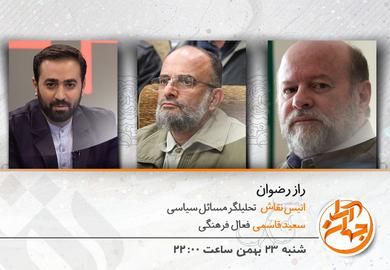Anis Nakash, the man convicted of attempting to assassinate a former Iranian prime minister, has spoken candidly about his crimes on a live television program.
On February 11, Nakash was invited to appear on the program Jahan Ara, broadcast by the Ofogh (“Horizon”) Network, a channel owned by Islamic Republic of Iran Broadcasting (IRIB). Introducing him, the program’s host and known supporter of former president Mahmoud Ahmadinejad, Vahid Yaminpour, described Nakash as a “veteran fighter for the liberation of Palestine and South Lebanon.” As the program went on, this rather simple laudatory introduction gave way to more sensational revelations from its respectful-looking guest, who expressed pride at what he had done.
At one point in the program, Nakash referred to the time when he was “in a French prison.” Yaminpour interrupted him in order to explain to the audience to what his guest had been referring. “A year after the victory of the Islamic Revolution,” he said, “Mr. Nakash set out for Paris for an operation to send Shapour Bakhtiar, the Shah’s prime minister, to hell, although the operation was not completed. It was stopped and Mr. Nakash was arrested in France.” [Persian Video]
The comments pertain to the assassination attempt against Shapour Bakhtiar on July 19, 1980 in Paris. After only 36 days as prime minister, Bakhtiar had left Iran for France on January 12, 1979, shortly before the victory of the Islamic Revolution on February 11, and was given political asylum by the government of French President Valéry Giscard d'Estaing. Once in Paris he founded the National Movement of Iranian Resistance, which aimed to overthrow the Islamic Republic.
The prevalent narrative is that the Islamic Revolution’s hanging judge Ayatollah Sadegh Khalkhali issued the order to assassinate Bakhtiar and publicly announced that anyone who carried out the death sentence would be recognized as an agent of the Revolutionary Court. But according to the memoirs of Mohsen Rafighdoost, a co-founder of the Revolutionary Guards, it was Ayatollah Mohammadi Gilani, a Revolutionary Court judge from 1980 to 1985, who gave Rafighdoost the authority to assassinate Bakhtiar. Based on this verdict, the Revolutionary Guards sent Anis Nakash, a Lebanese national and an architect by trade, and four other individuals to France to carry out the operation.
He Botched it
Nakash went to Paris, botched the operation and then blamed Khalkhali for it.
Nakash gave the following account to Fars News Agency in August 2011 [Persian Link]:
I did the surveillance. After two weeks I returned to Iran and told them I had found Bakhtiar’s home and had even made an appointment to interview him. I made a detailed plan to carry out the execution of Bakhtiar and started to prepare for it but unfortunately Mr. Khalkhali made a mistake and during an interview announced that he had dispatched commandos to Paris to execute Bakhtiar.”
Then Shapour Bakhtiar stopped answering his phone, would not meet anybody and the number of his guards increased...So the appointment that I had made with him to finish the job was canceled. But at the same time they called me from Tehran and said that Bakhtiar must be killed as soon as possible because they were highly worried about a coup d’état.
I got me a 7mm gun with a silencer and set out for Bakhtiar’s, but they were suspicious and did not open the door to the building. Without hesitation, I decided to break the lock with a bullet and go in. But the door to Bakhtiar’s office was bulletproof and I couldn’t do anything.
During the attempt, Nakash killed an elderly woman, who was one of Bakhtiar's neighbors, and injured one of his security guards. Then, when he shot at the door to Bakhtiar’s office, the bullet ricocheted and hit Nakash himself. When the French police arrived, Nakash shot at them. Police shot back and arrested him. A court sentenced him to life in prison. In July 1990, President François Mitterrand pardoned Nakash and four accomplices as part of a deal to free French hostages in Lebanon, which led to criticism from French magistrates and other critics. The five men were put on a plane bound for Tehran.
A Most Dangerous Man
After returning to Iran, Nakash went into commerce and founded a research organization called Aman. But there was speculation that this business was merely a cover. A report published by The Weekly Standard in 2010 referred to him as “the most dangerous man you have never heard of.” The article said he was “the man Iran often calls upon in times of trouble” and went on to describe him as “part consultant and part cleaner, a thug with a brain.”
The article said Nakash had been described in the press as a businessman who insisted he was no longer involved in terrorism — despite the fact that he made regular references to his “line of work.” It also reported that his terrorism links were extensive: “He’s more than just a link between Hezbollah and Iran, running messages back and forth,” the article read. “Some think Anis Nakash may well be the mastermind behind Hezbollah.”
Nakash did not succeed in his mission to kill Bakhtiar, but the Shah’s last prime minister did not escape assassination. On August 6, 1991, a team of three assassins killed Bakhtiar and his secretary in the Parisian suburb of Suresnes. The lead assassin, Ali Vakili Rad, was later arrested in Switzerland, extradited to France and given a life sentence. But as with the case of Nakash, he was released as part of a hostage deal with Iran. After 18 years in prison he was exchanged, in May 2010, for Clotilde Reiss, a young French woman and a language teacher in Iran who was arrested during demonstrations following the disputed 2009 presidential election and sentenced to 10 years in prison for spying.
On his return to Iran, officials gave Vakili Rad a hero’s welcome.
...And Proud Of It!
Nakash is proud of the assassination attempt even though it was not successful. “Had I been as experienced as I am now, I would have definitely devised a different plan for assassinating Bakhtiar,” he told Fars News Agency. But although his bragging is nothing new, the Jahan Ara broadcast is the first time an official Iranian media outlet has brazenly promoted the career of a known terrorist.
Again, Revolutionary Guards co-founder Mohsen Rafighdoost presents a different narrative of why the first attempt on Bakhtiar’s life failed. When Nakash was in Paris, he wrote in his memoir, “Abu Sharif had dispatched another group to kill Bakhtiar....They interfered with each other and the operation failed.” Abu Sharif was the nom de guerre of Abbas Agha-Zamani, another co-founder of the Revolutionary Guards. The first president of the Islamic Republic, Abolhassan Banisadr, appointed him as the Guards’ commander. But his tenure was short, and he was forced to resign after quarreling with Banisadr. In 1981, Ayatollah Khomeini appointed Agha-Zamani as Iranian ambassador to Pakistan and he remained in Pakistan until summer 2011, even though his term had ended earlier. Unlike Nakash, not much has been written about Abu Sharif.
“Talk About Me!”
During an interview in 2010, Nakash said he was “not afraid or ashamed” to talk about the assassination attempt against Bakhtiar. “I am proud of it [but] I believe that Iran has been negligent when it covers up the first assassination attempt against Shapour Bakhtiar.” Now it seems that Islamic Republic of Iran Broadcasting has taken a step toward addressing Nakash’s complaint.
The Ofogh channel, part of the IRIB network, broadcasts its programs worldwide. It started broadcasting on June 3, 2014 and most of its content is provided by Owj Arts and Media Organization. Owj first made the news in late 2013 when, on the eve of nuclear negotiations between Iran and the group of 5+1 countries, anti-American billboards appeared across Tehran. Owj was cited as the billboard designer. At the time, there were many reports that Owj is actually an affiliate of the Revolutionary Guards, although it claims to be an NGO and the Guards’ public relations team denied the rumors.
The recent Jahan Ara program focused on Imad Mughniyeh, also known as Hajj Radwan, the Lebanese Hezbollah’s military mastermind who was officially classified as a terrorist by both the European Union and the United States and was accused of complicity in major terrorist operations in France, Argentina and Lebanon. On February 12, 2008 he was killed in an explosion in Damascus. Hezbollah accused Israel of assassinating Mughniyeh. Israel denied responsibility but, in January 2015, an investigative report published in The Washington Post stated that the assassination of Mughniyeh had been a joint operation of the CIA under the approval of President George W. Bush and Israel’s Mossad.
After the Mughniyeh assassination, interviews with Nakash appeared all over the Arab media, where he was described as Mughniyeh’s mentor. So, when it invited Nakash to speak on a program about Mughniyeh, IRIB helped corroborate that characterization of Nakash — and praise his activities.
By inviting a known terrorist to speak on a live TV program, the producers of Jahan Ara and IRIB have signalled an editorial shift, and a willingness to cast the activities of known criminals in a favorable light. With more firsthand accounts from international terrorists likely to be broadcast, this shift could mean interesting television viewing in the coming months.
visit the accountability section
In this section of Iran Wire, you can contact the officials and launch your campaign for various problems

























comments